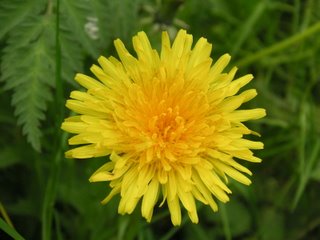
Thursday, November 16, 2006
The Daily Hump: Dandelion
 I owned an album when I was very young, "Dandelions Never Roar"; even to a 3-year-old the title's pun was plainly obvious. But it wasn't until 25 years later that I wondered whether this common flower really had a feline namesake or whether the similarities in name were purely coincidental.
I owned an album when I was very young, "Dandelions Never Roar"; even to a 3-year-old the title's pun was plainly obvious. But it wasn't until 25 years later that I wondered whether this common flower really had a feline namesake or whether the similarities in name were purely coincidental.I'm now able to report that this is not a coincidence. Speakers of Middle English called the dandelion dent-de-lioun. From here it's pretty easy to see the Old French (dent-de-lion) influence and translate the root; "tooth of lion". This description of course refers to the flower's sharply indented leaves. As the AHD reports,
The English spelling reflects the pronunciation of the Old French word at the time it was borrowed into English. The t in dentdelion probably disappeared early in Old French, having been absorbed into the related sound of the d. The earliest recorded instance of the word occurs in an herbal written in 1373, but we find an instance of dandelion used in a proper name (Willelmus Dawndelyon) in a document dated 1363.
 It's interesting to note that in Modern French the name for the flower has absolutely nothing to do with lions or teeth; the word is pissenlit, which amusingly translates to "urinate in bed". As Wikipedia states this likely refers to the flower's well-known diuretic properties. The dandelion's herbal properties are also what gives it its genus, Taraxacum. Botanical.com says that
It's interesting to note that in Modern French the name for the flower has absolutely nothing to do with lions or teeth; the word is pissenlit, which amusingly translates to "urinate in bed". As Wikipedia states this likely refers to the flower's well-known diuretic properties. The dandelion's herbal properties are also what gives it its genus, Taraxacum. Botanical.com says that Taraxacum...is derived from the Greek taraxos (disorder), and akos (remedy), on account of the curative action of the plant. A possible alternative derivation of Taraxacum is suggested in The Treasury of Botany:In any event, next time you travel to Paris, drink too much wine and piss your sheets, just claim it was the dandelion.The generic name is possibly derived from the Greek taraxo ("I have excited" or "caused") and achos (pain), in allusion to the medicinal effects of the plant.
Labels: Middle English, Old French, The Daily Hump
:: posted by David, 8:01 AM